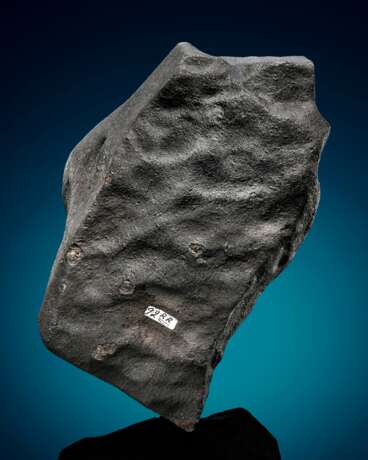ID 389966
Lot 23 | COMPLETE PLAINVIEW METEORITE WITH H.H. NININGER PROVENANCE
Valeur estimée
$ 7 000 – 10 000
The natural exterior surface of this meteorite is 99% covered in fusion crust (the result of melting as the rock plunged through the Earth’s atmosphere). The rippling in evidence is also an artifact resulting from frictional heating which occurs during atmospheric penetration. The crust is tinted in a palette of cocoa-hues with darker accents — a patina acquired from having been exposed to the elements while laying on Earth’s surface. The original Nininger catalog number “92RR” was inked in black on white paint. Originating from the surface of an asteroid orbiting the Sun between Jupiter and Mars, the specimen is unusually dense due to the metallic flakes scattered throughout its mass.
149 x 99 x 59mm (5.75 x 4 x 2.33 in.)
1.666kg (3.66 lbs)
Provenance: H.H. Nininger, American Meteorite Museum, Winslow, AZ
First discovered in 1915 outside of the north-central Texas town of Plainview, the area was visited nearly twenty years later by Dr. H. H. Nininger (1886-1986) who would later be called “The Father of Meteoritics”. Dr. George Merrill of the Smithsonian, another legendary figure, tried to discourage Nininger from returning to Plainview given his belief there was little likelihood of recovering additional material. Nininger however was determined, and he personally recovered hundreds of additional meteorites including the current offering. The actual Nininger catalog number “92RR” is in evidence.
Plainview is rich in metal and, as a result, this stone feels unusually dense. If cut — which should never be the case — countless grains of metal would be seen suspended throughout its silicate matrix. Plainview is an H-chondrite regolith breccia. It formed at the surface of its parent asteroid. It is rich in solar-wind-implanted rare gases and contains a few CM-chondrite clasts, many impact-melt-rock clasts and a variety of clasts of different metamorphic grades. Plainview specimens are historically important, not only because of the meteorite shower itself, but the greatness of the personalities involved in their lore. The example offered here is an unusual lively Plainview specimen in appearance.
Christie's would like to thank Dr. Alan E. Rubin at the Institute of Geophysics and Planetary Physics, University of California, Los Angeles for his assistance in preparing this catalogue.
| Adresse de l'enchère |
CHRISTIE'S 8 King Street, St. James's SW1Y 6QT London Royaume-Uni | |
|---|---|---|
| Aperçu |
| |
| Téléphone | +44 (0)20 7839 9060 | |
| Commission | see on Website | |
| Conditions d'utilisation | Conditions d'utilisation |




